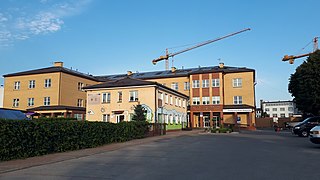
Academy of Economics in Białystok was opened on January 5, 1996. It is a non-governmental collegiate-level institution of higher education in the city of Białystok, one of several such institutions including the largest University of Białystok locally. The academy was ranked in 2008 by the Polish edition of Newsweek as best in the Podlaskie Voivodeship. It offers bachelor's and master's degrees in three general fields of knowledge, as well as one-year postgraduate studies.
Polish Ministry of Marine Economy was created on 5 May 2006 during the reshuffling of the government of Kazimierz Marcinkiewicz.

The Katowice urban area, also known as the Upper Silesian urban area, is an urban area/conurbation in southern Poland, centered on Katowice. It is located in the Silesian Voivodeship and in a small part of the Lesser Poland Voivodeship. The Katowice urban area is the largest urban area in Poland and 21st largest urban area in the European Union. According to Demographia, its population is 1,903,000.

The Republic of Cameroon is a decentralized unitary state.

The Ministry of Regional Development was a ministerial department within the government of Poland. The ministry was created under the premiership of Kazimierz Marcinkiewicz on 31 October 2005, having its functions devolved from the previous Ministry of Economy and Labour. The department was merged with the Ministry of Transport, Construction and Marine Economy in November 2013 under Prime Minister Donald Tusk, creating the Ministry of Infrastructure and Development.

The Ministry of the Presidency (MPR) was the department of the Government of Spain that, from 1974 to 2023, assured the link between the different Ministries and the Prime Minister and it was responsible for the relations between the Government and the Parliament. This department also supported The Crown in the exercise of its functions.

The Ministry of Labour and Social Economy (MITES) is the department of the Government of Spain responsible for planning and carrying out the government policy on labour relations and social economy.

Ministry of Transport, Construction and Maritime Economy was formed on 21 November 2011, from transformation of Ministry of Infrastructure.

The Ministry of Infrastructure and Development was a ministerial department of the government of Poland. The ministry was created in November 2013 following the merger of the Ministry of Regional Development and the Ministry of Transport, Construction and Marine Economy during the cabinet of Prime Minister Donald Tusk. The last minister responsible for the department was Andrzej Adamczyk. It was split in late 2015 into Ministry of Energy, Ministry of Infrastructure and Construction and Ministry of Development.

The Ministry of Digital Affairs is a ministry of the Polish government founded in December 2015, dissolved in October 2020 and founded again in May 2023. Split from the Ministry of Administration and Digitization, the Ministry is responsible for matters regarding development in the cyber sphere for Poland. The first Minister of Digital Affairs was Anna Streżyńska. After she was recalled on 9 January 2018, the Ministry was under personal supervision of the Polish Prime Minister Mateusz Morawiecki until 17 April 2018 when Marek Zagórski was appointed the Minister of Digital Affairs. The ministry was made defunct in 2020 following a Council of Ministers decree. The Ministry is functioning again since 1 May 2023 following a Council of Ministers decree.
Departmental decorations of Poland are decorations issued by Polish ministers and heads of some other state establishments. They do not have the status of Polish state decorations, which are usually issued by the head of the state.

Ministry of Marine Economy and Inland Navigation was formed in 2015, from transformation of Ministry of Infrastructure and Development. It was dissolved in 2020.

A Ministry of the Republic of Italy is an administrative organ of the Republic of Italy, placed at the top of Italian public administration and is characterised by one or more specific competencies, with an organised structure, often varying over time.
In Poland, public roads are classified into two kinds of road hierarchies: road classes and road categories.

Ministry of Transportation and Construction was formed on 31 October 2005, from transformation of Ministry of Infrastructure.
Ministry of Transport and Maritime Economy of Poland since 2001 has been included in the competence of the Ministry of Infrastructure.
Ministry of Economic Cooperation with Foreign Countries was a Polish government administration office, its tasks included implementation of state policy and coordination of activities in the field of economic, trade and scientific and technical relations with foreign countries.

Ministry of Economy and Labour is a Polish abolished government administration office in charge of economy, labor, regional development, tourism.

Ministry of Economy, Labour and Social Policy is a Polish abolished government administration office serving the minister in charge of economy, labor, regional development, tourism, social security.

Grzegorz Paweł Puda is a Polish politician and local government official, member of the Sejm of the 8th and 9th term, in 2019 secretary of state at the Ministry of Investment and Development, 2019–2020 Secretary of State in the Ministry of Funds and Regional Policy, from 2020 Minister of Agriculture and Rural Development in the second government of Mateusz Morawiecki.











